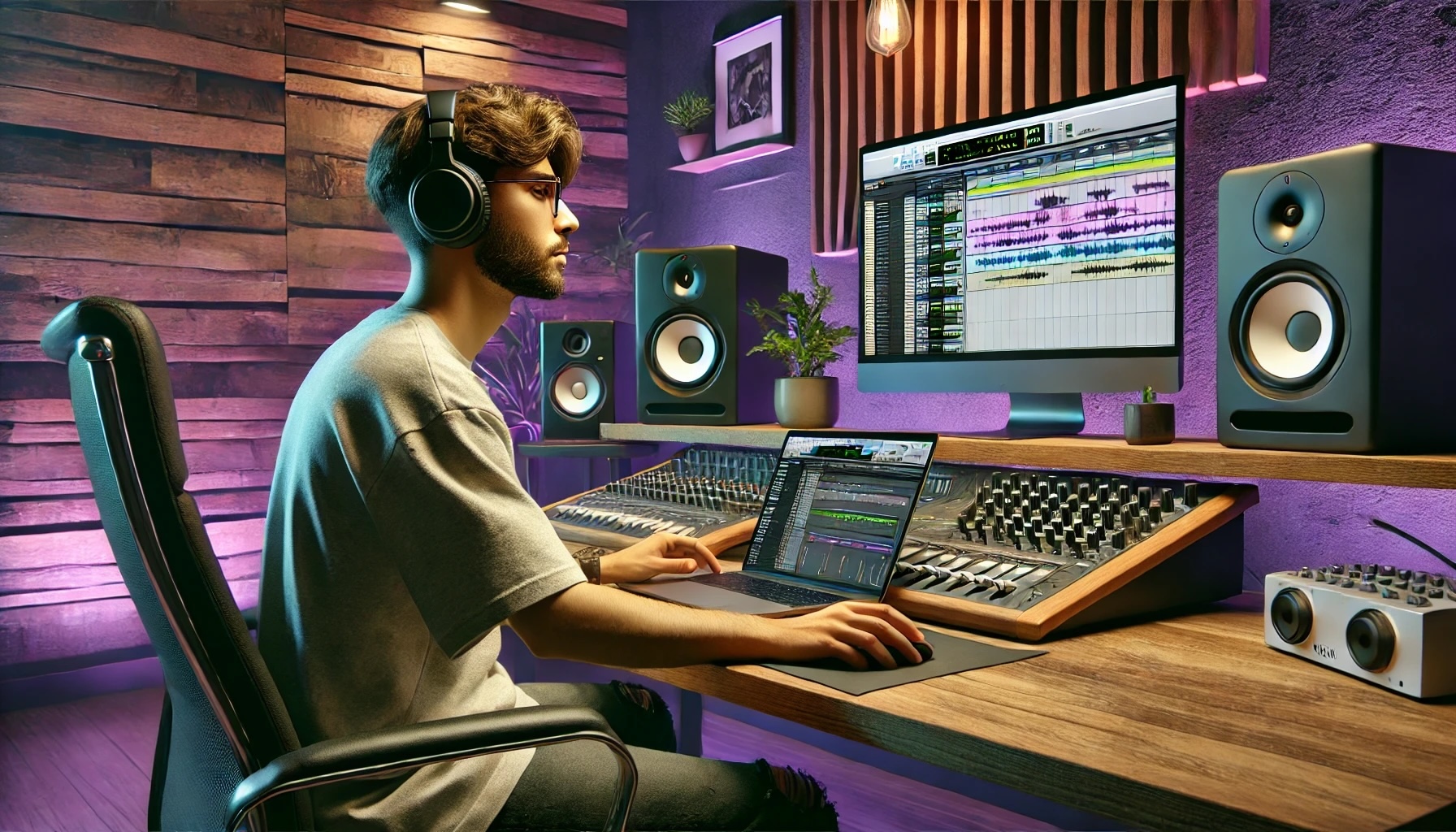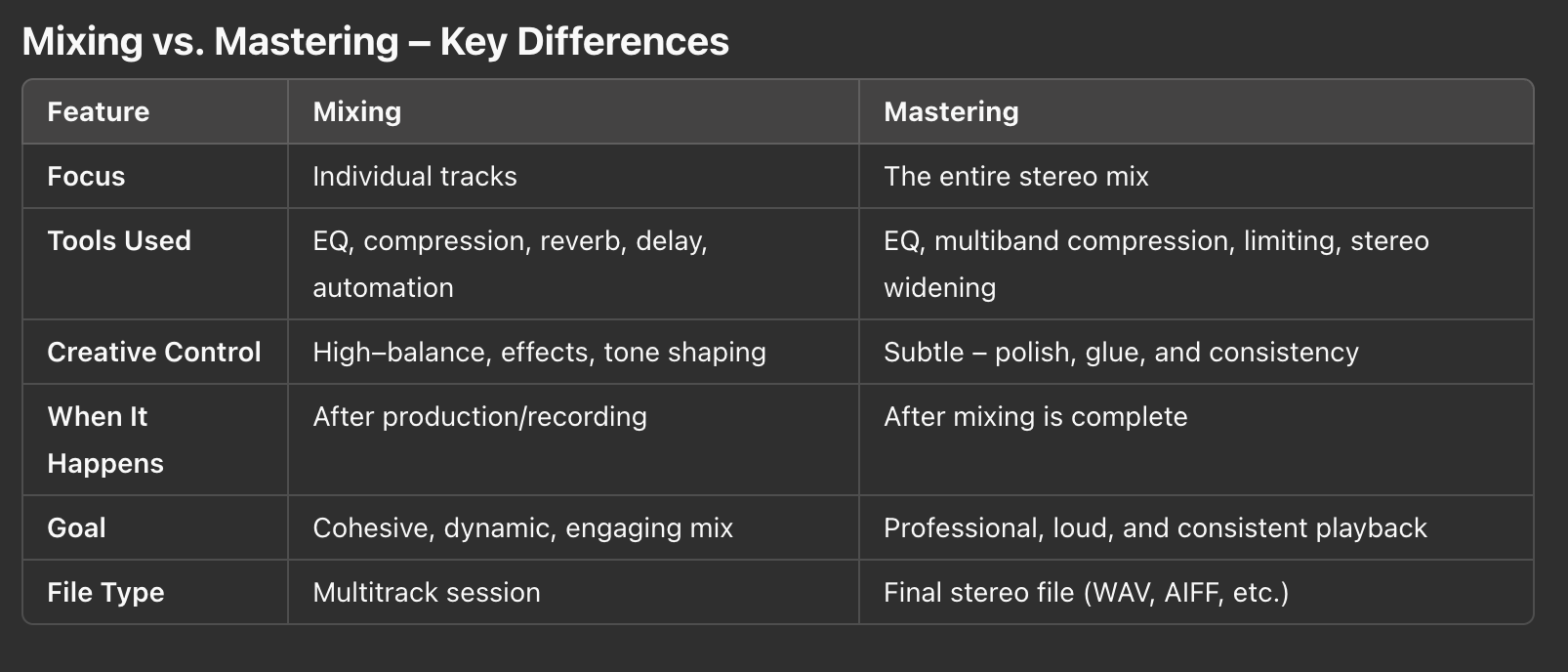Mixing vs Mastering: What's the Difference?

Mixing and mastering are often mentioned together—but they serve very different roles in the music production process. If you’ve ever wondered why your track doesn’t sound as clean or as loud as the pros, understanding these two stages is essential.
Let’s break down the difference between mixing and mastering, what each process involves, and why both are critical in creating a pro-sounding track.
What is Mixing?
Mixing is the stage where all the individual elements of your song—vocals, drums, synths, guitars, bass, etc.—are blended together into a cohesive whole. It's where the creative and technical meet to shape the sound of the track.
Key Elements of Mixing:
-
Volume balancing – Making sure no element overpowers the rest.
-
Panning – Spreading instruments across the stereo field for depth and space.
-
EQ (Equalization) – Shaping the tone of each element to avoid frequency clashes.
-
Compression – Controlling dynamics and adding punch or consistency.
-
Reverb & Delay – Adding depth, space, and vibe.
-
Automation – Adjusting levels, effects, or panning over time for movement and emotion.
Goal of Mixing:
To create a dynamic, balanced, and emotionally engaging track where each part feels intentional and supports the overall vision.
When It Happens:
Right after recording or producing your track, once all elements are in place.
 ⭐️ Take my Free EXPERIENCE: Ableton Live Mini-Course ⭐️
⭐️ Take my Free EXPERIENCE: Ableton Live Mini-Course ⭐️
What is Mastering?
Mastering is the final step in the music production chain. It’s the process of preparing your mixed track for release by enhancing its clarity, consistency, and loudness across all playback systems—from earbuds to car stereos to club speakers.
Key Elements of Mastering:
-
Final EQ adjustments – Shaping the overall tone of the entire mix.
-
Multiband compression – Subtle dynamic control across different frequency ranges.
-
Stereo enhancement – Widening or tightening the stereo image.
-
Limiting – Maximizing loudness without clipping.
-
Noise removal – Polishing out unwanted hums or artifacts.
-
Exporting formats – Preparing high-quality files for streaming, vinyl, or CD.
- Reference LUFS levels: Delivering a consistent loudness level to distribution platforms.
Goal of Mastering:
To make sure the track sounds polished, professional, and consistent with other commercial releases. It’s the final “glue” that brings everything together.
When It Happens:
After the final mix is approved and no more creative changes are being made.
Mastering 101: 7 Steps to Make Your Mixes Radio-Ready

 ⭐️ Start by downloading all of my FREE Music Production Guides ⭐️ It took me years to learn this stuff!
⭐️ Start by downloading all of my FREE Music Production Guides ⭐️ It took me years to learn this stuff!Do You Need Both?
Yes.
Mixing and mastering serve different roles, and both are essential for a track to sound finished and competitive. A great mix can fall flat without mastering. A poor mix can’t be fixed in mastering.
If you’re just starting out, focus on learning to mix well. As you grow, you’ll learn how mastering enhances your vision. Many artists outsource mastering to a dedicated engineer with a fresh perspective—and that’s a smart move when your ears are too close to the track.
Final Takeaway
Mixing is about crafting the sound and feel of your song. Mastering is about getting it ready for the world.
Both stages matter. Both require skill. And both are part of what makes music sound amazing.
So next time you’re finishing a track, ask yourself: Is it mixed? And once it is: Is it mastered? Because when both are done right, the result doesn’t just sound good—it sounds pro.
Also check out: How Do I Prepare My Mix for Mastering?
⭐️ Download my Free Magic Delay settings Guide ⭐️
⭐️ Download my Free Magic Reverb settings Guide ⭐️
#protools #daw #homestudio #recordingschool #recording #musicproduction
Also read:
9 Must-Know Beatmaking Techniques for Beginner Music Producers in 2025
9 Must-Know Vocal Production Techniques for Beginner Music Producers in 2025
9 Must-Know Music Production Techniques for Beginners and Home Studios in 2025

Hey, I'm Futch - Music Production Coach and Ableton Certified Trainer
Learn how to make your first song and beat in Ableton Live with my
FREE 90-minute Ableton Live course
I've been teaching audio engineering and music production for 35 years.⭐️
Check out my new online music production program: Music Production Ninja...







